高中必修一英语单词Unit3(课堂PPT)
- 格式:ppt
- 大小:1.78 MB
- 文档页数:32
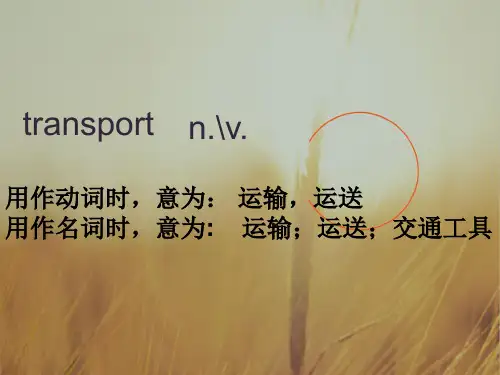

![高中英语必修一Unit3_[阅读] 3 PPT课件 图文](https://uimg.taocdn.com/e3079ebd9ec3d5bbfd0a7478.webp)

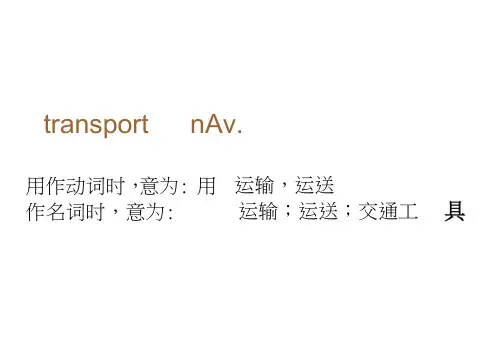
transport nAv.用作动词时,意为: 用作名词时,意为: 运输,运送运输;运送;交通工transporter 名词,运输者transportable形容词,奇运输的transportation名词运送,运输transfer移交,转移;transform转变,变化; translate 翻译;transplant 移植【观察思考】1) “Would you like meat or fish?" “I'dprefer fish, please* “你喜欢肉还是“请给我鱼鱼?” 吧。
”2) I prefer English to Chinese.我喜欢英语甚于中文。
3) I prefer speaking the truth to lying.我宁愿讲实话而不愿说谎。
4) I prefer to go to America for my further study.我更愿意去美国深造。
5) A nne prefers me to replace her at the meeting.安妮更愿意我茯替她去参加会议。
6) W ould you prefer that we put off our meetina till next week?你直否审愿鸞杷我们【归纳总结】+ prefer用作动词,表示“更喜欢,认为… 胜过…",可用于如下结构:+ prefer sth更喜欢某物+ prefer A to B 喜欢A甚于B+ prefer doing A to doing B 喜欢做A甚于做B+ prefer to do sth更喜欢做某事+ prefer sb to do sth宁愿某人做某事+ prefer to do A rather than do B 宁愿做A 而不做B+ prefer that ...(should) do ・••宁愿/喜欢- 过去式- ■Attention prefer preferredprefer v. preference n.“宁愿做A事而不愿做B事”的几种表达: prefer doing A to doing prefer to do A rather than do B would rather do A than do B would do A rather than do BIf you have a chance to travel, how are you going there?on foot by bike by busby train by ship/sea by plane/air]Which kind of transport do you prefer to J use:bus or train? Think about theadvantages and disadvantages of each form of transport and fill in the form.1 expe nsive2 j ourney ends farfrom the cityairplane 1 quick 2 efficient 3 providesmealsLook at the map and list the countries that the Mekong flows through.^^HIThalia ndCambodiaViet namThe Mekong River is called Lancang River j n China. It goes through Myanmar Laos ThailaCambodia^ Vietnam and pours into the海South China Sea .Preparation for their trip.Wang Kun and Wang Wei's dream・Wang Wei is stubborn.Wang Kun and his sister Wang Wei are dreaming about taking a great bike trip .They have the idea to cycle along the Mekong River from where jt begins to where jt ends ■Information of dreaml.ever since middle Wang Wei has dreamed school:about taking a great bike trip2. two years ago:Wang Wei bought an expensive mountain bike Wang wei visited their3. last year:cousins and got theminterested in cycling too4. after graduation from college:They got the chance to take a bike trip5. Now Wang Wei is planning the schedule for the tripWhat do you think about Wang Wei? stubborn(Find out some evidences in Para2.)V. terfall<1* /• /曹Jr\/ deltabend4 •亠 'valleyWhat can they see during the journey? It begins in a glacier on a mountainj ninghd Province ・Then, it movesquickly. It becomes rapids as 吐 passes through deepvalleys travelling across westernYunnan Province・Sometimes, the river becomes a waterfall and enters wide valleysIt makes wide bends or meanders through low valleys to the plains where rice grows ・At last, the river delta enters theSouth China Sea.I B MHI^BHMH^MMBMBI^B HM I JMIe.g. Ever since youleft me, l5ve been tryto hide the pain.自从你离开了我,我一直在掩饰内心的伤痛。

Unit 3Travel journal单词课件prefer 名词(A )+to+名词(B )喜欢A 多于B (比较时,to 两边的成分要一致)eg:I prefer dogs to cats.prefer doing to doing 喜欢做…而不喜欢做…eg: I prefer speaking the truth to lying.prefer to do rather than do 宁愿…而不愿意…( than 后要省去to)eg: I prefer to walk there rather than go by bus.Which kind of transport do you prefer to use: bus or train? (P 17)prefer sb. to do sth. 宁愿让某人做某事prefer that sb. (should) do 更宁愿某人...prefer doing 宁愿做某事eg:Would you prefer that we put off our wedding till next mouth?你是否更愿意把我们的婚礼推迟到下个月?n. preference 偏爱;喜好have a preference for sth. 偏爱某物give a preference to... 优先考虑...;优待...2. disadvantage n.不利条件;劣势Think about the advantages and disadvantages. (P17)at a disadvantage 处于不利地位put ab. at a disadvantage 使某人处于不利地位to one's disadvantage 对某人不利的take advantage of 利用...eg: The man spoke with a Spanish accent. he was at a disadvantage against the native Eiglish speakers.2. disadvantage n.不利条件;劣势3. ever since 自...以后;自从...;从...起(1)作介词,后接表示时间的名词(短语),常与现在完成时或现在完成进行时连用。

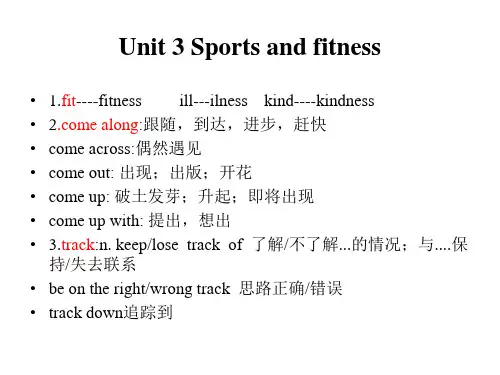
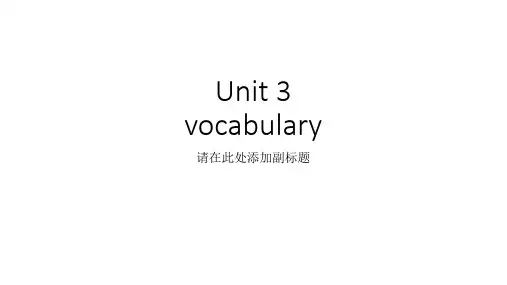
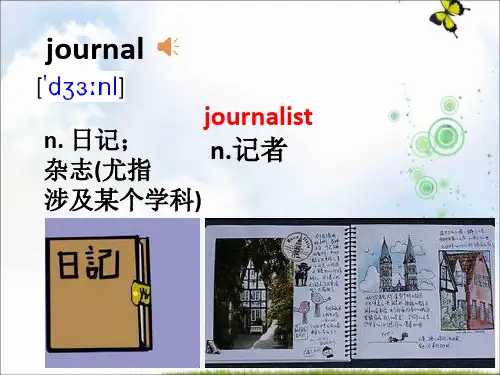
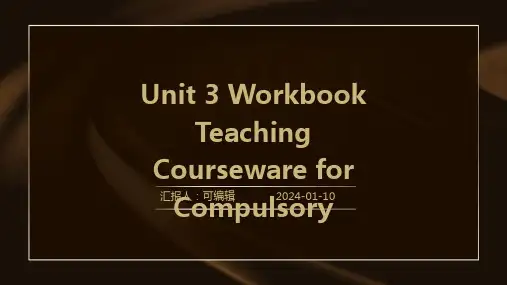
高中英语(人教版)必修一 Unit 3 Vocabularyextension 课件Unit 3 Vocabulary extension 课件In this vocabulary extension courseware, we will further explore and expand our knowledge of the words and phrases introduced in Unit 3 of the high school English textbook, "Vocabulary extension." Through this courseware, we aim to enhance our understanding and usage of the vocabulary in a practical and engaging way. Let's delve into the world of words together.1. Synonyms and Antonyms (同义词与反义词)Synonyms are words that have similar meanings, while antonyms are words with opposite meanings. Learning synonyms and antonyms can enrich our vocabulary and help us express ourselves more precisely. In this section, we will explore some synonyms and antonyms related to the vocabulary in Unit 3.1.1 Synonyms (同义词)1.1.1 Diligent - HardworkingDiligent indicates industriousness, while hardworking denotes a strong work ethic.Example: Tom is a diligent/hardworking student who always completes his assignments on time.1.1.2 Abstract - ConceptualAbstract refers to something existing in thought or as an idea, while conceptual implies relating to or based on concepts.Example: The artist's painting is an abstract/conceptual representation of emotions.1.1.3 Ecstatic - ThrilledEcstatic suggests an overwhelming sense of joy, while thrilled conveys a strong excitement.Example: Lily was ecstatic/thrilled when she received the news of her acceptance to the university.1.2 Antonyms (反义词)1.2.1 Modest - ArrogantModest signifies a humble or moderate attitude, while arrogant implies an excessive sense of self-importance.Example: Sara is a modest/arrogant individual who never boasts about her achievements.1.2.2 Expand - ContractExpand means to increase in size, while contract means to become smaller.Example: When heated, the metal will expand/contract due to thermal expansion.1.2.3 Compose - DecomposeCompose refers to creating or forming, while decompose means to break down or disintegrate.Example: Microorganisms help decompose/compose organic matter in the soil.2. Collocations (搭配)Collocations are words that often go together and sound natural when used in combination. Mastering common collocations can greatly improve our fluency and accuracy in English. Here are some collocations related to the vocabulary in Unit 3.2.1 Collocations with "Give"2.1.1 Give a speech (发表演讲)Example: The President will give a speech on national television tonight.2.1.2 Give a hand (帮助)Example: John gave a hand to his neighbor by helping her carry the groceries.2.1.3 Give advice (提供建议)Example: I always turn to my mother for advice when I face difficulties.2.2 Collocations with "Make"2.2.1 Make an effort (努力)Example: Sarah made a great effort to pass the examination.2.2.2 Make progress (取得进步)Example: The students have made significant progress in their English skills this semester.2.2.3 Make a decision (做出决定)Example: It's time for you to make a decision about your future career path.3. Idioms (习语)Idioms are expressions with figurative meanings that differ from the literal meanings of the individual words. Incorporating idioms into our English conversations can make them more vivid and colorful. Let's explore a few idioms related to the vocabulary in Unit 3.3.1 Hold one's horses (耐心等待)Meaning: To ask someone to pause or be patient.Example: Hold your horses! The results haven't been announced yet.3.2 Hit the books (努力学习)Meaning: To study intensively.Example: The exams are approaching, so it's time to hit the books.3.3 The ball is in your court (轮到你了)Meaning: It is your turn to take action or make a decision.Example: I've done my part of the project; now the ball is in your court.In conclusion, this vocabulary extension courseware has provided us with synonyms, antonyms, collocations, and idioms related to the vocabulary in Unit 3 of the high school English textbook. By expanding our knowledge and understanding of these words and phrases, we can improve our ability to communicate effectively and confidently in English. Let's continue to explore and make English learning an enjoyable journey.。